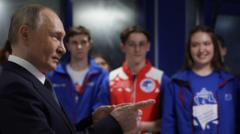During the Arctic Forum in Murmansk, Russian President Vladimir Putin remarked on the intensifying geopolitical competition in the Arctic, specifically referencing Donald Trump's plans to acquire Greenland, but refraining from criticism. His comments signal a shift towards potential economic collaboration with the U.S., highlighting a transformation in relations amid the war in Ukraine.**
**Putin Embraces U.S. Arctic Ambitions Amidst Changing Geopolitical Landscape**

**Putin Embraces U.S. Arctic Ambitions Amidst Changing Geopolitical Landscape**
**In a surprising nod to U.S. interests, President Putin acknowledges Trump's Greenland aspirations while promoting Russian-American cooperation in the Arctic.**
In a notable address at Russia's Arctic Forum in Murmansk, President Vladimir Putin acknowledged the growing geopolitical competition in the Arctic, specifically referencing former President Donald Trump's ambitions regarding Greenland. In a strikingly diplomatic tone, Putin avoided criticizing Trump and instead emphasized the significance of these plans, suggesting that the U.S. approach has "deep historical roots."
Despite the complexities entailed in international relations, Putin indicated that the U.S. would persist in seeking its geopolitical, military, and economic interests in the Arctic. However, he firmly stated, "As for Greenland, this is a matter for two specific countries. It has nothing to do with us," a statement of deliberate detachment given Russia's own contentious incursions into Ukraine.
As the Biden administration previously cultivated a confrontational stance toward Russia, Putin's remarks raise questions about a potential thawing of relations. With an eye toward attracting U.S. investment in the Arctic—an area rich in natural resources—Putin's envoy for foreign investment, Kirill Dmitriev, made clear that Russia stands ready for cooperation in sectors deemed mutually beneficial. He noted that discussions with U.S. officials have been ongoing, but any concrete agreements would necessitate a resolution to the ongoing conflict in Ukraine.
The Kremlin appears optimistic that these overtures could entice Washington, particularly after U.S. officials expressed viewpoints aligning with Russian narratives regarding the war. For example, Trump's envoy, Steve Witkoff, was recently seen conceding to Moscow's stance on annexed Ukrainian territories during a media appearance.
Adding another layer to the discussion, Nikolai Patrushev, an influential aide to Putin, suggested that divisions in U.S. politics may present openings for collaboration, depending on which party is in power. "When the Democrats were in power, they took one view. The Republicans have another," he stated, marking a departure from past confrontational rhetoric.
As the Arctic Forum unfolded in Murmansk, locals reflected on this evolving geopolitical landscape. Individuals expressed differing views about America's role, treating discussions of cooperation with cautious optimism. One local, Elina, remarked on Russia's strength and the importance of alignment with powerful entities.
Meanwhile, Dmitriev highlighted a particularly unconventional form of cooperation he hopes to establish with American entrepreneur Elon Musk, underscoring Russia’s interest in contributing nuclear technology for future space missions.
In a region asserted by both opportunism and ambition, the Kremlin's overtures toward the U.S. could signal a recalibration of priorities in Arctic policies as global dynamics continue to shift.




















